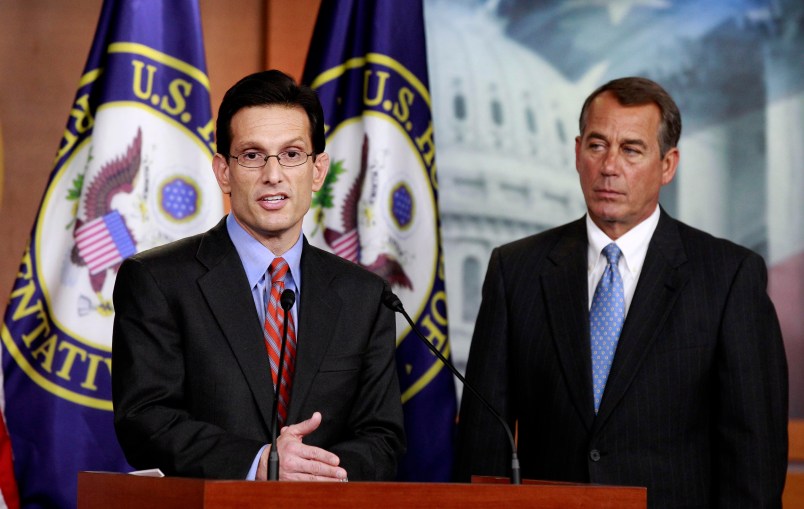Let’s face it, this isn’t the most productive Congress. In fact it’s even less productive than Harry Truman’s famous “do-nothing Congress.”
But one lesson House Republicans are taking home from Majority Leader Eric Cantor’s stunning defeat is that any hint of cooperation with Democrats comes at a potentially career-ending price. Cantor was — at least proclaimed to be — committed to bridging deep divides over several complex and controversial bills.
Three legislative projects — an Obamacare alternative, immigration reform and a Voting Rights Act fix — were a heavy lift even before Cantor lost to tea party-backed economics professor David Brat in his GOP primary last Tuesday.
Now they’re even more doomed.
1. A Republican alternative to Obamacare
It has been more than four years since President Obama signed Obamacare into law, and the GOP has come up short on the “replace” portion of its “repeal and replace” slogan. That’s largely because they’ve had a hard time devising a viable alternative that doesn’t look like Obamacare.
But this was the year they’d finally do it: in January, for the first time, Cantor promised his members that they’d get to vote on a replacement plan in 2014. “House Republicans will rally around and pass an alternative to Obamacare this year,” he told them. Met with skepticism, his aides insisted he was holding regular meetings with leaders, committee chairs and right-wing members. They said he had not only the commitment but the political capital to unite his underlings, from swing-state pragmatists to deep-red conservatives, around an alternative.
Now, with the majority leader stepping down effective July 31, that capital has all but evaporated, and the already daunting task is leaderless. There’s even less reason to think that the House GOP will come up with a health care bill of their own. And that’s bad news for the party: numerous Republicans and conservative experts have warned that without a replacement proposal, repealing Obamacare is untenable, especially now that its core benefits have taken effect and the law appears unlikely to collapse on its own.

2. Immigration reform
Immigration wasn’t the only reason Cantor lost, but his expressed support for reform galvanized right-wing opposition to his reelection bid. Some 22 percent of Brat voters said it played a role in their vote against Cantor, according to one Republican poll. That’s enough to terrify House Republicans, many of whom have deeply conservative primary electorates and were already scared of touching the cause that the tea party base abhors.
Democrats and pro-reform advocates point out that Cantor was hardly a champion of reform. They are correct in that he helped block House action on the Senate-passed immigration overhaul. But the majority leader has endorsed legal status for undocumented youth and an earned path to legalization, with conditions, for the other 12 million immigrants living in the country illegally. It’s those modest overtures toward reform that angered some on the right.
One direct casualty may be the ENLIST Act, which would let undocumented
immigrants who serve in the military to gain permanent residency and
eventually citizenship. Cantor was the point person attempting to resolve intra-conference disputes and steer the proposal through the House, and GOP leadership aides were saying just last month that the bill could come up as a standalone. That’s much less likely now.
3. Voting Rights Act fix
In February of 2013, Cantor joined civil rights hero John Lewis on a civil rights pilgrimage to landmarks of the movement in Alabama and came back humbled. Four months later the Supreme Court gutted a core provision of the Voting Rights Act, the historic 1965 law, and Cantor said he’d talk to Lewis, a Democratic congressman from Georgia, about ways to fix it.
“I’m hopeful Congress will put politics aside, as we did on that trip, and find a responsible path forward that ensures that the sacred obligation of voting in this country remains protected,” Cantor said at the time. This January, members of the House and Senate settled on bipartisan legislation to patch up and modernize the section of the law designed to proactively snuff out voter discrimination in the parts of the country that have a history of such behavior.
Cantor kept his powder dry as his fellow Republicans angled against a fix. Democrats held out hope: if there’s one person who could bring the GOP on board, they thought, it was Cantor. Last month, TPM asked House Minority Whip Steny Hoyer (D-MD) where the effort stood, and he pointed to Cantor’s comments in support of voting rights as reason to be optimistic.










